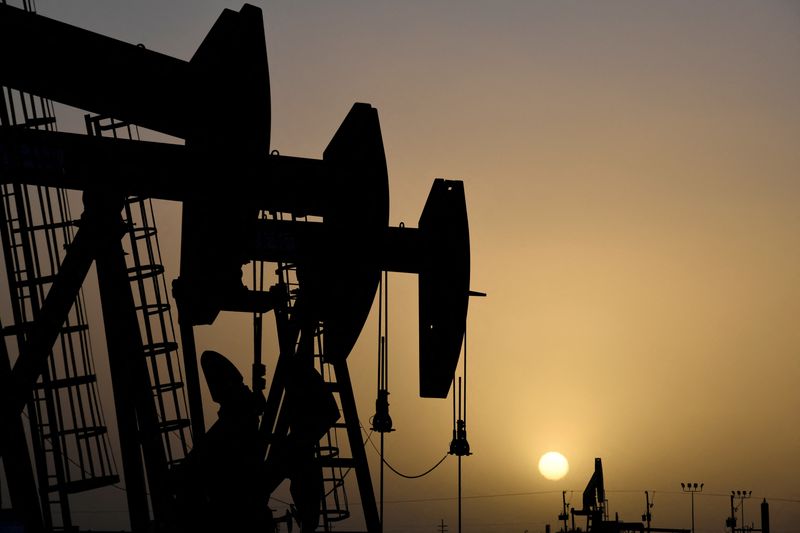By Scott DiSavino
NEW YORK (Reuters) -Oil prices climbed about 2% to a near three-month high on Monday on tightening supply, rising U.S. gasoline demand, hopes for Chinese stimulus measures and technical buying.
Brent futures rose $1.67, or 2.1%, to settle at $82.74 a barrel, while U.S. West Texas Intermediate (WTI) crude rose $1.67, or 2.1%, to settle at $78.74.
Those were the highest closes for Brent since April 19 and for WTI since April 24, as both contracts were pushed into technically overbought territory above their 200-day moving averages.
The 200-day moving average had been a key point of technical resistance for both benchmarks since August 2022.
Bob Yawger, director of energy futures at Mizuho Bank, said a move above the 200-day moving average "generally stops out the (speculative) shorts (and) attracts traders looking for new entry points."
Both crude benchmarks have already climbed for four weeks in a row with supplies expected to tighten due to cuts from the Organization of the Petroleum Exporting Countries (OPEC) and allies like Russia, a group known as OPEC+.
Oil's rise has reflected "tightening conditions as Saudi oil output cuts impact the market ... even as summer demand has been somewhat stronger for gasoline and jet fuel," Citi Research said in a note.
Strong demand and worries about supply issues boosted U.S. gasoline futures to their highest level since October 2022.
"The rally in crude oil is impressive as it occurs as Europe is looking very weak right now, the U.S. is slowing down, and China’s Politburo isn’t expected to unveil major stimulus this week," Edward Moya, senior market analyst at data and analytics firm OANDA, said in a note.
In the euro zone, business activity shrank much more than expected in July as demand in the bloc's dominant services industry declined while factory output fell at the fastest pace since COVID-19 first took hold, a survey showed.
In the U.S., business activity slowed to a five-month low in July, dragged down by decelerating service-sector growth, closely watched survey data showed, but falling input prices and slower hiring indicate the Federal Reserve could be making progress on important fronts in its bid to reduce inflation.
Investors have priced in quarter-point hikes from the Fed and European Central Bank (ECB) this week, so the focus will be on what Fed Chair Jerome Powell and ECB President Christine Lagarde say about future rate increases. [MKTS/GLOB]
A majority of economists polled by Reuters still expect this will be the last increase of the current U.S. tightening cycle, after data this month showed signs of disinflation, eliminating the need for the Fed to lift rates further.
Higher interest rates increase borrowing costs and can slow economic growth and reduce oil demand.

In China, the world's second-largest economy and second-biggest oil consumer, leaders pledged to step up policy support for the economy amid a tortuous post-COVID recovery, focusing on boosting domestic demand, signalling more stimulus steps.
Analysts at Deutsche Bank (ETR:DBKGn) said demand for oil in China "is now surpassing expectations," which "helps to add confidence in the ability of China to make up (two-thirds) of oil demand growth this year."